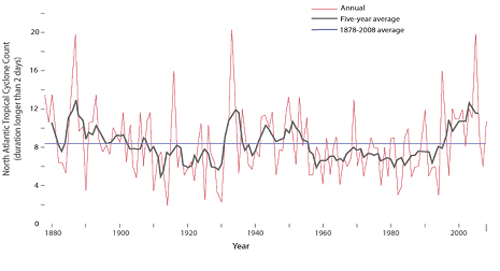IPCC och de minskande stormarna 2014-09-09
Although projections under 21st century greenhouse warming indicate that it is likely that the global frequency of tropical cyclones will either decrease or remain essentially unchanged, concurrent with a likely increase in both global mean tropical cyclone maximum wind speed and rainfall rates, there is low confidence in region-specific projections of frequency and intensity…. The global number of ETCs is unlikely to decrease by more than a few percent due to anthropogenic change. (ETC= stormar utanför tropikerna). A small poleward shift is likely in the SH storm track, but the magnitude is model dependent. There is only medium confidence in projections of storm track shifts in the Northern Hemisphere. Nevertheless, model results suggests that it is more likely than not that the N. Pacific storm track will shift poleward, and that it is unlikely that the N. Atlantic storm track will respond with a simple poleward shift. There is low confidence in the magnitude of regional storm track changes, and the impact of such changes on regional surface climate.”
Men om Atlanten säger de “Shorter term increases such as those observed in the Atlantic over the past 30 to 40 years appear to be robust and have been hypothesized to be related, in part, to regional external forcing by GHGs and aerosols, but the more steady century-scale trends that may be expected from CO2 forcing alone are much more difficult to assess given the data uncertainty in the available tropical cyclone records.
Ökning av stormar över Atlanten alltså, under de senaste 30 -40 åren. När jag läser referenserna till det fjortonde kapitlet letar jag efter namnet Christopher W. Landsea, NOAA National Weather Service, National Hurricane Center, Miami, Florida. En mycket respekterad forskare. Det finns bara en rapport från honom från 1999 bland IPCC:s referenser. Själv saknar jag följande från 2007. Ännu mer forskning har samlats som talar emot en ökande trend på lång sikt. http://www.aoml.noaa.gov/hrd/Landsea/landsea-eos-may012007.pdf Dessutom en artikel om denne forskare http://www.climate.gov/news-features/features/will-hurricanes-change-world-warms Han har funnit att det finns en periodicitet i Atlantens stormar. Från slutet av sjuttiotalet fram tills idag är det en ökning under dessa 30 -40 år men varför ska man ha en sådan kort tidshorisont? Har även hittat andra exempel i IPCC:S rapport på en för kort tidshorisont.

IPCC diskuterar alltså att det kan bli en minskning av stormar utanför tropikerna ETC (Extra Tropical Cyclones), men även de tropiska stormarna kan minska eller vara på samma nivå. Fast man tror på högre vindstyrka och mer nederbörd. Det tycks inte bli fler extrema väderhändelser. Men det kan bli en förskjutning av vädermönster norrut.
När jag läser detta samtidigt som jag har en hel hög med läroböcker omkring som predikar mer extremväder i framtiden kan jag inte låta bli att sucka.